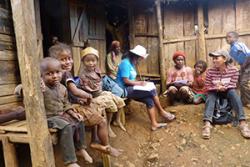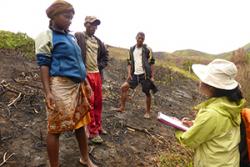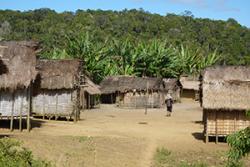Livelihood projects designed to compensate for the local costs of conservation may not be reaching the right people
 A researcher interviews people living in remote areasConservation of tropical forests is widely recognised as a good thing: these forests lock up carbon which reduces the effects of climate change, contain biodiversity found nowhere else on earth, and influence local availability of water. However conservation can also have negative impacts on local people. New research shows that compensation schemes introduced to reach the poorest and most vulnerable are not always benefiting those they are meant to help.
A researcher interviews people living in remote areasConservation of tropical forests is widely recognised as a good thing: these forests lock up carbon which reduces the effects of climate change, contain biodiversity found nowhere else on earth, and influence local availability of water. However conservation can also have negative impacts on local people. New research shows that compensation schemes introduced to reach the poorest and most vulnerable are not always benefiting those they are meant to help.
Protected Areas have been set up in tropical forests around the world in recognition of their importance for biodiversity, and more are being established with the express aim of locking up carbon to combat climate change, under a process known as REDD+ or Reducing Emissions from Deforestation and Degradation. However, it is now well recognised that conservation can have negative as well as positive impacts on people living around protected area boundaries, who are in many cases extremely poor. For example, if local people are dependent on the forest for agriculture and harvesting products essential to their livelihoods, then forest protection can result in hardship. For this reason when new protected areas are set up with funding from the World Bank and some other donors, there is a process through which those who will lose out are identified and compensated. This is known as social safeguarding.
 Many villages in rural areas of Madagascar donβt appear on any maps making it hard to ensure they are reached by conservation projects.A team from the University of Antananarivo in Madagascar and ΒιΆΉΝψ in the UK have carried out detailed research looking at the implementation of the social safeguarding process around a new protected area established with World Bank funding in the eastern rainforest of Madagascar. They show that the social safeguard process has not succeeded in identifying and reaching all the people negatively affected by the implementation of the new protected area.
Many villages in rural areas of Madagascar donβt appear on any maps making it hard to ensure they are reached by conservation projects.A team from the University of Antananarivo in Madagascar and ΒιΆΉΝψ in the UK have carried out detailed research looking at the implementation of the social safeguarding process around a new protected area established with World Bank funding in the eastern rainforest of Madagascar. They show that the social safeguard process has not succeeded in identifying and reaching all the people negatively affected by the implementation of the new protected area.
Dr Mahesh Poudyal, School of Environment, Natural Resources and Geography, ΒιΆΉΝψ says:
βCompensation is supposed to reach the people most negatively impacted by conservation and take account of particularly poor or vulnerable people. We have found that the compensation has disproportionately reached those more easily accessible, such as those who live closer to local administrative centres, who are relatively better off, and who have positions of authority locally. While this wonβt surprise anyone familiar with the common issues of elite capture in development projects, we think it is very a significant finding especially at this stage in the global process of developing safeguard systems for new REDD+ projects.β
While the work is looking at a new protected area in eastern Madagascar, the authors believe it has wider relevance. Prof Julia Jones of ΒιΆΉΝψ says:
βAvoiding possible negative impacts of protected areas is very challenging; those affected are often widely distributed and hard to reach. Improvements however are clearly needed to ensure that some of the poorest people on our planet are not footing the bill for conservation with has global benefitsβ.
 Professor Bruno Ramamonjisoa from the University of Antananarivo says:
Professor Bruno Ramamonjisoa from the University of Antananarivo says:
βMadagascarβs forests are incredibly valuable and should be protected. However for conservation to be successful local people need to be included and need opportunities to benefit from the conservation and must not be made poorer by it.β
This work is part of the p4ges project () and is funded by the UK governmentβs ecosystem services for poverty alleviation programme (). The article is published in Global Environmental Change. A link to the article is available here:
Publication date: 27 January 2016
